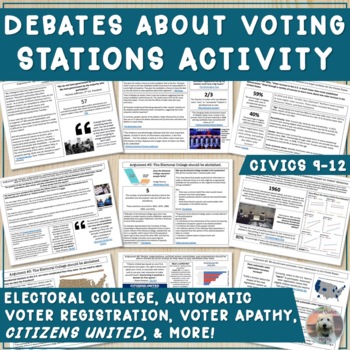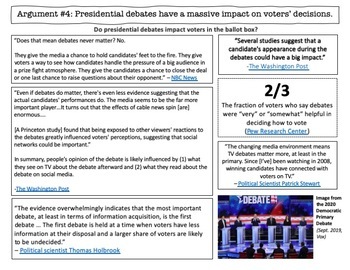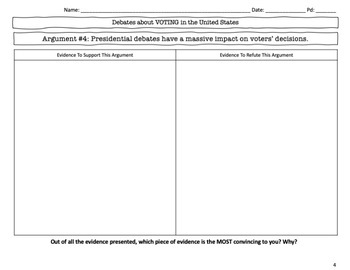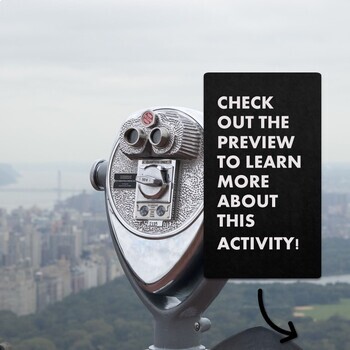Debates about Voting in the US: Turnout, Electoral College, Citizens United, etc
- Zip
What educators are saying
Also included in
- This bundle of 20+ activities will help you teach major portions of your Civics & U.S. Government class!BUNDLE INCLUDES: Direct & indirect democracy worksheetEnlightenment influence on U.S. government worksheetOrigins of U.S. government stations activity Make your own Mayflower Compact self-Price $45.00Original Price $57.00Save $12.00
Description
Is voting important? Does my vote count? Should we have the Electoral College? Should corporations be able to spend money on elections? Use these ready-to-go stations to have students analyze and build arguments about voting.
ZIP FILE INCLUDES:
- 6 stations with debates about voting/elections in the United States (2 pages for each argument)
- Student handout
- Culminating activity: Debate Opening Statement Writing
- Optional extension activity: Creative Visual Propaganda
- Teacher directions
CHECK OUT THE PREVIEW!
The stations offer a variety of evidence to support and refute arguments, including:
- Individual votes don't matter.
- The Electoral College should be abolished.
- Individuals and corporations should be able to donate as much money as they want to any campaign.
- The United States should have automatic voter registration.
- Voter apathy and low voter turnout is a major problem in the United States.
- Presidential debates have a major influence on elections.
Each argument includes a variety of article excerpts, polls/statistics, images, charts, and more.
For each argument, students analyze the evidence presented. They decide if the evidence supports or refutes the argument, and they complete the corresponding student handout. For each piece of evidence, students are challenged to consider:
- Does this evidence support the argument, or does this evidence refute the argument?
After students have analyzed the 6 major debates, they will pick a side on an argument of their choice! They'll act as a member of a debate team and write an opening statement to support an argument of their choice! This activity includes directions AND a rubric!
This activity includes an optional creative extension activity where students create visual propaganda to support an argument of their choice.
As students consider the 6 arguments listed above, they'll be evaluating ideas like:
- Does the Electoral College overvalue the voice of less-populated, rural states? Or, does the Electoral College make sure everyone in the nation is represented?
- Is money speech? Do corporations deserve free political speech?
- Do individual votes matter?
- Should we use the popular vote to determine the president?
- Why do American voters feel apathetic? Is the problem voters' attitudes, or is the problem voter suppression?
- How does the media affect presidential elections? Do debates actually change voters' minds?
This activity covers topics such as: Citizens United v. FEC, voter apathy, voter turnout, presidential v. midterm turnout, presidential debates & their effects, voter suppression, automatic voter registration (AVR), & more!
I used this activity in a Civics and Economics class and an AP Government class. It would be appropriate for any government class where you are teaching issues surrounding voting in the United States. This would be great to use during the 2020 presidential election cycle!
The stations, student handout, culminating writing activity, and optional extension activity are all included in a PDF document. This PDF is included in a zip file with the teacher directions. Please ensure you are able to open PDFs and zip files.
*************************************************************************************************************
Related Resources
Constitutional Issues: Comparing the Convention to Today's Issues
Ranking the Presidents: Research + Creative Activity for Presidential Legacies
Understanding Judicial Review: What If It Didn't Exist? (Supreme Court WKSHT)
*************************************************************************************************************
Teacher Tips
Get TpT credit toward future purchases!
Please leave a quick rating and comment for this product. From your My Purchases page, click the "Provide Feedback" button. TpT will give you feedback credit -- lowering the price of your future purchases! Plus, your feedback helps me create better resources for my students AND you! ☺
Follow Me!
Click the green star next to my store logo. Become a follower to receive email updates about my resources!






